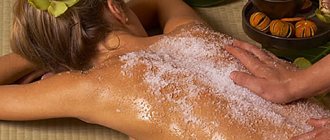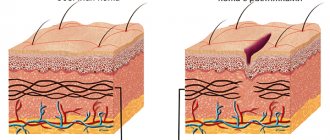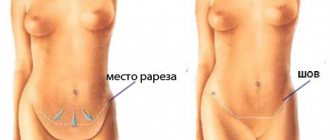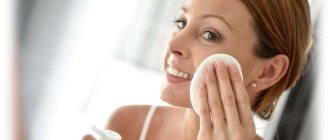The condition of the skin is an indicator of how healthy the body is. Therefore, any skin problems indicate problems, and it is imperative to establish what they are.
Peeling on the neck is one of the negative symptoms that is often ignored. This phenomenon in most cases eliminates itself, but this does not mean that its cause has disappeared. And sometimes, after the appearance of peeling, other deviations occur as the provoking pathology progresses. This means that you cannot ignore this symptom - you should find out why it occurred.
Allergic reaction
Allergies very often cause skin problems. It occurs as a result of human interaction with a certain substance.
If the body is sensitive to this substance, the immune system perceives it as dangerous, which is signaled by the production of histamine.
The result may be a rash, swelling, redness and peeling in different parts of the body. First of all, these symptoms affect open areas, including the neck.
A variety of substances can be among the irritants.
The main ones are:
- Food;
- plants;
- pollen;
- chemical substances;
- medicines;
- textile;
- animal hair;
- cosmetical tools;
- household chemicals, etc.
Antihistamines help eliminate pathological symptoms. They block the production of histamine, thereby eliminating allergy symptoms. However, it is impossible to completely overcome the disease itself, since it is caused by the characteristics of the immune system. Therefore, it is very important to identify allergens and avoid contact with them - this will prevent the occurrence of repeated attacks.
Video - how to find out what you are allergic to?
Peeling skin: treatment
Having found the root cause of xeroderma, you can begin to eliminate the symptoms. If the problem is insufficient hydration or rapid evaporation of moisture from the surface, it is necessary to select cosmetics with a high content of fatty components. Medications are used only on the recommendation of a doctor. Such products should contain hydrocortisone (0.5–2%) in the composition.
If the skin on the body is peeling, you need to change the gel and soap. They can give this effect in the first place. It is better to wash your face with clean water or a decoction of medicinal herbs. Cleansing lotions and tonics should not contain alcohol, which causes dryness and tightens the skin.
Hormonal changes
Changes in hormonal levels can cause a lot of difficulties in the body. They lead to disturbances in the metabolic process and in the functioning of internal organs. The skin is sensitive to such problems. In this regard, dry and flaky skin in the neck area can be caused by hormonal imbalances. With a significant hormonal imbalance, not only these symptoms appear, but also a rash, itching, and burning. In particularly severe cases, ulcers may form.
Sometimes hormonal imbalance is due to physiological reasons. This happens during pregnancy or puberty. Menopause in women is associated with a decrease in estrogen production in the body, which leads to aging of the skin and the appearance of adverse symptoms. In these cases, the violations will be eliminated after stabilization of the hormonal levels.
But it also happens that changes in hormone production occur without objective reasons. This is dangerous not only due to skin diseases, but also due to numerous disruptions in the functioning of the body. Therefore, the problem needs to be diagnosed and neutralized, and it is advisable to do this at the first negative symptoms.
If your neck is flaky and itchy, you should consult a doctor, because this may be one of the signs of hormonal imbalance, which is very dangerous for complications.
Treatment in this case is carried out with hormonal drugs to return the body to a normal state. Experts also prescribe auxiliary symptomatic therapy.
When should you take a hormone test? Video:
Recommendations for caring for problem skin
When caring for problem skin, you should follow a number of rules. You need to ensure that the skin is constantly moisturized. Do not wash your face with soap or use alcohol-based lotions or toners. Before going outside, apply cream to the skin at least 40 minutes before leaving the house. When outdoors, avoid direct sunlight and severe frosts.
Rubbing
The skin on the face is delicate and suffers from strong mechanical actions, so before rubbing the skin is lubricated with massage oil. To improve the effect, you can add 2 drops of essential oils.
For flaky skin use:
- neroli oil;
- orange oil;
- rose oil
Suitable for red and inflamed skin:
- avocado oil;
- almond oil;
- wheat germ oil;
Next, with relaxed index and middle fingers, draw short lines, as if shading the skin or drawing small curls. They begin to rub from the forehead, along the massage lines, gradually descending. The procedure improves blood supply and metabolic processes of the skin.
Skin softening
Before applying softening masks, the skin must be prepared. To do this, it is first cleaned and then steamed for about 5-10 minutes. Masks are applied to the skin, avoiding the mouth and eye areas.
Softening mask for all skin types:
- Honey - 1 tbsp. l.
- Natural yogurt - 2 tbsp. l.
- Protein - 1 pc.
- Rosewood oil - 2 drops.
Combine all components into a homogeneous mass and apply to face. Keep the mask on your face for 15 minutes. Rinse off with lukewarm water, then moisturize the skin with cream.
Mask for dry skin:
- Fresh yolk - 1 pc.
- Glycerin - 1 tsp.
- Honey - 1 tbsp. l.
Mix everything. A thick layer of mask is applied to the facial skin for 20 minutes. Then the mask is washed off with cotton pads soaked in water. Repeat the procedure once every 7 days, course 10 weeks.
Skin cleansing
Skin care begins with cleansing. To avoid drying out your skin, you should wash your face no more than 2 times a day. Makeup residue on problem skin is removed with micellar water. A deeper cleansing is required once a week. Here you can use a scrub marked “for sensitive skin”; they contain fine abrasives and have a cream-like texture.
Peeling and redness on the skin of the face occurs not only due to improper care. These symptoms can be signs of various diseases. If peeling, itching or redness does not go away within 3 weeks, you should consult your doctor.
Diabetes mellitus as a cause of skin problems
In diabetes mellitus, an abnormally large amount of sugar is observed in the patient's blood. This may be due to excessive insulin production or insufficient insulin synthesis. This is also facilitated by a person’s poor diet (eating a lot of sweets).
Elevated glucose levels cause numerous disorders in the body, and one of them is skin problems. If a person has dry skin that is constantly flaky and itchy, it makes sense to check whether he has diabetes. With this disease, dehydration occurs, which leads to such symptoms.
You can get rid of these phenomena with competent therapy, with the help of which the amount of glucose in the blood can be kept normal. For this purpose, hypoglycemic agents are used, which are selected taking into account the clinical picture.
Medical reasons
Quite often, many women and men experience certain unhealthy manifestations on the neck: peeling, spots, rashes, premature formation of wrinkles, redness and dryness. Let's try to analyze in detail the causes and possible solutions to just such a problem as redness and dryness of the skin on the neck: erythema, lichen, ichthyosis, dermatitis, fungal infections, eczema, diabetes.
This is a short list of diseases, one of the symptoms of which may be redness and even itching. However, there are a number of other reasons and factors that lead to similar phenomena on the neck and face.
To accurately weed out serious health problems and focus on cosmetic techniques and medications that will relieve symptoms and bring your skin into complete order, you will most likely have to visit specialists such as an allergist, dermatologist, infectious disease specialist, neurologist, who will find out the causes and They will prescribe treatment or send you to a beauty salon.
Fungal infections
They are caused by penetration into the body and active reproduction of the fungus. Some varieties of mycosis provocateurs live in the human microflora constantly, waiting for favorable conditions. To become infected with other species, the patient must have contact with the carrier.
With strong immunity, the body copes with pathogens, preventing their reproduction. But the immune system can be weakened by adverse influences. TO
these include:
- infectious diseases;
- chronic pathologies;
- poor nutrition;
- avitaminosis;
- drug abuse;
- long-term treatment with antibiotics;
- bad habits, etc.
Under the influence of any of these factors, the body's protective functions weaken, as a result of which mycosis can develop.
In this case, peeling of the skin, itching, redness, and swelling often occur. In this case, pathological phenomena can affect not only the cervical part, but also other areas.
To overcome skin problems, you need to suppress the activity of the fungus. Antimycotic drugs are intended for this. To alleviate acute manifestations, additional agents may be prescribed: anti-inflammatory, decongestant, moisturizing, healing, etc.
How to choose a moisturizer?
Very dry skin on the face and body needs constant and proper care with moisturizing cream, lotion, milk, and tonic. This will help protect the thin epidermis from adverse environmental influences - strong wind, cold air, ultraviolet radiation. Particular attention should be paid to the skin of the hands and face.
Oil-based products perfectly eliminate moisture deficiency. Grape seed oil, almond oil, and shea butter are applied to the face. For washing, it is advisable to use milk, for example, Lait Demaquillant Absolu (Vichy), Natura Siberica. Problem areas on the body where there is flaky skin can be lubricated with olive oil.
Among cosmetic preparations, it is better to give preference to brands that are presented in pharmacies: Vichy (Lipidiose Nutritive), Bioderma (Atoderm). Natural ingredients and proven action through research will help restore freshness, firmness and elasticity to the skin. The disadvantage of such products is their cost, which is much higher than those available in cosmetic stores. When buying a moisturizer, you need to pay attention to the ingredients. The one that contains hyaluronic acid and vitamin E is better suited for the skin. The price will depend on the manufacturer and the naturalness of the ingredients. Sometimes the product may be chosen incorrectly, so it is better to seek advice from a professional cosmetologist or dermatologist.
Ichthyosis and psoriasis
These are two diseases that are characterized by flaking of the skin. They differ in the mechanism and causes of occurrence, but have similar symptoms. It is worth considering them in more detail.
The main cause of ichthyosis is heredity. It is caused by a special genetic mutation. With this disease, the skin in the damaged areas takes on a resemblance to fish scales and is very flaky.
In severe forms of ichthyosis, keratinization of the skin is observed. The disease is accompanied by the formation of cracks through which infection enters the body.
Psoriasis develops under the influence of several factors (abundance of stress, bad habits, negative environmental conditions).
The disease is characterized by the appearance of spots on the body and severe peeling of the damaged areas.
It is impossible to cure this pathology; it can only be controlled through therapy.
Why does my skin peel?
It has been found that dry skin flakes more often than other types. This is due to an insufficient supply of natural moisturizers - oily substances that are produced by the sebaceous glands.
Peeling scales and a feeling of tight skin can be caused by the following reasons:
- Incorrectly selected products for cosmetic care and cleansing of the face and body.
- Allergic reaction to washing powder, fabric softener, dishwashing detergent, cosmetics.
- Taking baths or showers too often.
- Climatic conditions (high air temperature, wind, direct sunlight).
- Dry air in winter.
- Bad habits.
- Insufficient fluid intake.
- Consequences of taking medications.
- Dermatological diseases.
Men also often experience peeling skin on their body or face. The reason for this may be alcohol abuse, smoking addiction and poor diet. Sensitive skin types react to mechanical stress with the appearance of redness and the formation of scales, so rubbing and using harsh cleansers is not recommended.
Lack of vitamins
For proper functioning, the body must have a sufficient amount of vitamins and essential microelements. They ensure the activity of internal organs, maintain tone, and promote performance.
If any element is missing, problems may arise. And if there is a deficiency of several vitamins, then adverse changes occur in the body. And often they affect the condition of the skin, which loses elasticity, becomes dry and sensitive.
Various reasons can provoke the development of vitamin deficiency.
These include:
- stressful situations;
- long-term illness;
- poor nutrition;
- pregnancy;
- problems with the endocrine system, etc.
There is only one way to combat peeling skin caused by a lack of vitamins - saturating the body with them. Vitamin and mineral complexes are used for this purpose. Following a proper diet can also help.
How do you know which vitamins are missing? Video from Dr. Evdokimenko:
On fingers
With frequent contact with water, a person’s hand skin becomes very dry, because water dries out the epidermis and washes away the protective layer. This problem can be corrected if you regularly take baths with such softening ingredients as a decoction of oak bark, nettle, chamomile, St. John's wort, linden, and sage. Often dry skin on the fingers occurs due to weakened immunity or vitamin deficiency in spring and autumn. In this case, nutritional adjustments are needed. If you have congenital dryness or a genetic predisposition, your fingers need softening throughout the year.
Other causes of peeling skin on the neck
Skin problems can be caused by many different reasons.
In addition to those listed above, the following can be mentioned:
- Presence of parasites . Helminths, once in the human body, disrupt the functioning of internal organs and interfere with the normal course of metabolic processes. Because of this, the patient does not receive enough beneficial microelements, which negatively affects the condition of the skin.
- Dysbacteriosis . This violation causes the leaching of beneficial substances from the body. It also causes dehydration, which leads to dryness and flaking of the skin in different parts of the body.
- Bathing in hot water . The influence of high temperatures negatively affects the condition of the epidermis. Prolonged exposure to hot water is especially harmful.
- Poor quality care products . The presence of a large number of chemical elements in them harms the skin.
- Wrong choice of cosmetics . It is very important to select skincare products according to your skin type. For dry skin types, you need to use special moisturizing creams.
Detection of unfavorable symptoms requires attention from the patient. Sometimes peeling of the cervical area is not dangerous, but very often it indicates serious abnormalities in the body. They need to be diagnosed and eliminated to avoid complications.
Dryness and redness of the skin of the hands
Why does the skin on my hands dry out? Women are especially concerned about this combination of pathologies such as dryness and redness. If the skin bursts at the same time, then most likely this is a consequence of lack of care. To prevent dryness and redness of the skin of your hands, as well as dermatitis, blisters and peeling, which can occur due to poor hygiene, you need to constantly lubricate them. Folk recipes provide excellent hydration and nutrition effects. Our ancestors also advised:
- apply cream, sour cream or make milk compresses after each hand wash;
- use unrefined vegetable oil as a compress at night under gloves.
Diagnosis of dry itchy skin
As a rule, an experienced dermatologist or a doctor of any other specialization needs a simple visual examination to understand the condition of the skin and find out how moisturized they are. A special point is to find out why dry areas of skin itch. In this case, the specialist is helped by a complete history taking, and sometimes a comprehensive examination.
Signs of dry skin:
- unnaturally smooth and shiny surface;
- itching, redness;
- roughness, flabbiness;
- complaints of “tightness”;
- cracks;
- reduced turgor.
What are the symptoms of peeling and itching?
Itching is different from itching - of course, if you just have something itching, you shouldn’t immediately suspect the worst. First, you need to carefully examine the areas of the skin that bother you and listen to your condition. If you have a strong feeling that the cause is an allergy, under no circumstances should you postpone a visit to the doctor - severe forms of allergies can be accompanied by serious conditions, including Quincke's edema, from which you can die.
External causes (insect bites, sunburn, etc.) usually cause localized itching —one or more specific areas itch and hurt. As a rule, irritation is accompanied by characteristic redness and passes relatively quickly.
so-called prickly heat - irritation due to insufficient evaporation of sweat - also has characteristic manifestations. In order to cope with it, as a rule, it is enough to start carefully observing hygiene and wearing natural fabrics.
Itching and flaking that affect certain parts of the body (hands, areas under the knees, scalp under the hair) can signal scabies , ringworm or incipient psoriasis . Conditions in which exfoliated areas of the skin cause wounds and cracks are especially dangerous - since in this case an infection can occur and treatment will take much longer.
Blisters and sores, a rash in areas that itch are a signal of a possible infectious disease - for example, chicken pox or measles. With these diseases, the rash first appears in isolated areas and then quickly spreads throughout the body.
If the itching you experience has no obvious cause, covers the entire body and prevents you from sleeping, contact a specialist immediately. The sooner treatment is started, the faster you will be able to get rid of unpleasant symptoms.
Itching all over the body is a very alarming signal. It is he who, as a rule, speaks about serious internal diseases, including, in particular, diabetes mellitus, tumors, leukemia, and hepatitis. It may subside for a while or be permanent - one way or another, the patient notes that the skin does not stop itching and peeling for a long time.
The principle of combating the manifestations of peeling
In certain cases, the appearance of pathological detachment of the epidermal layer develops against the background of the following diseases, which require specific treatment to eliminate the cause of the development of the pathology, and as a result, peeling of the skin disappears:
- seborrheic skin lesions;
- psoriasis;
- systemic lupus erythematosus;
- ichthyosis;
- dry erythema;
- ringworm and its varieties;
- scarlet fever;
- skin damage due to fungal infection and other conditions.
The development of pathology can be stopped on your own by using appropriate products for local application, maximally nourishing and moisturizing areas of the skin that are subject to the process of active exfoliation. In case of nutritional disorders, additional intake of fat-soluble vitamins helps restore the natural balance of cell layer renewal.
But if the condition worsens or the cause of the signs of pathology is unclear, you should consult a dermatologist who will competently conduct a diagnostic examination, which will help determine the most appropriate course of treatment. The main goal of diagnostics in this case is to exclude the presence of an infectious pathogen of any kind, which requires the subsequent use of specific treatment.
Useful information on the topic:
- Calling a dermatologist to your home
- Fungal infections
- Rash on the body
- Sexually transmitted diseases
- How to get tested
- Wart removal
- Removal of condylomas
- Tests for STIs
- Removal of papillomas
- Skin rash
- Pyoderma
- Skin structure
- Mushroom tests
- Diagnosis of sexually transmitted infections
Prevention
Regarding preventive measures, the following recommendations should be highlighted:
- using only high-quality cosmetic products;
- if you stay in the sun for a long time, you should use protective equipment;
- balanced diet;
- maintaining personal hygiene.
In addition, you need to systematically undergo preventive medical examinations from specialized doctors, which will prevent the disease or diagnose it in a timely manner.











